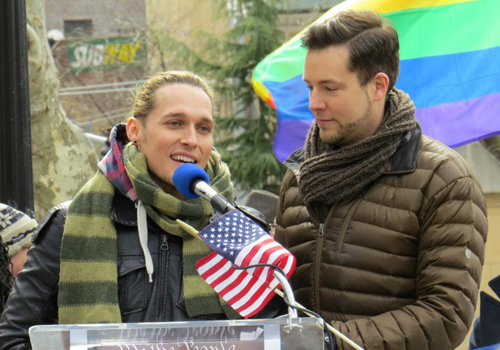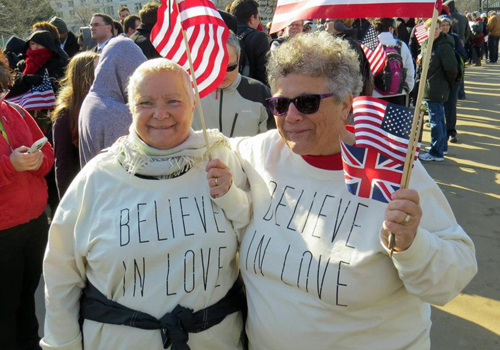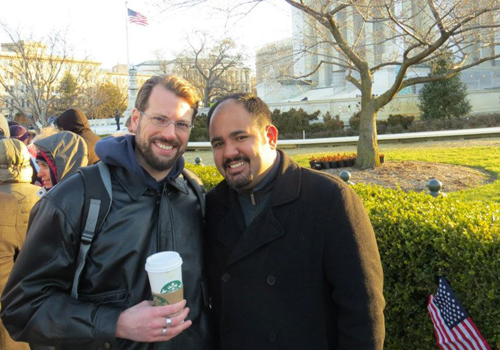 During the week of June 24 the U.S. Supreme Court will issue a decision in relation to Edith Windsor's challenge of the Defense of Marriage Act (DOMA). Section 3 of DOMA denies legally married same-sex couples more than 1,100 rights and benefits associated with marriage. One of these is the right of a U.S. citizen to assist a foreign spouse to gain permanent residence and citizenship in the USA.
During the week of June 24 the U.S. Supreme Court will issue a decision in relation to Edith Windsor's challenge of the Defense of Marriage Act (DOMA). Section 3 of DOMA denies legally married same-sex couples more than 1,100 rights and benefits associated with marriage. One of these is the right of a U.S. citizen to assist a foreign spouse to gain permanent residence and citizenship in the USA.
The outcome of the court's DOMA decision will impact LGBT Americans and their families in a multitude of ways. However, one group that arguably has the most to gain from a favorable decision is binational same-sex married couples. Not only are such couples denied the general range of federal rights and benefits associated with marriage, but they also deal with the additional stress and trauma of having to find ways to physically stay together in the same country.
DOMA and Its Impact on Binational Same-Sex Couples
There are thousands of binational same-sex couples currently residing in the U.S. (and thousands more living outside the country) in which one of the partners is a U.S. citizen or U.S. permanent resident. Due to DOMA, neither a U.S. citizen nor a U.S. permanent resident can sponsor a same-sex spouse for immigration, as this falls under federal law. American citizens can, via marriage, sponsor an opposite-sex spouse for permanent residence and eventual citizenship. Permanent residents of the U.S. can sponsor an opposite-sex foreign spouse for permanent residence through marriage. Binational same-sex couples in the U.S. (both married and non-married) have historically been forced to pursue extreme measures in order to maintain their relationships:
- Seeking temporary immigration status for the non-U.S. partner via a temporary visa (e.g., tourist, work, student visa categories) has helped some couples stay together physically in the U.S. for a defined and limited period of time. However, this has often come at considerable financial cost. Additionally, it has been accompanied by the stress of still having to find a permanent solution to being able to stay together physically over the long term. Temporary visas come with significant restrictions for the non-U.S. citizen in the relationship, making it virtually impossible to move easily from one city to another given that work and student visas are invariably locked to one specific institution.
Efforts to Assist Binational Same-Sex Couples
A number of organizations have been active in assisting binational same-sex couples, in terms of both raising awareness about the problems they face and outlining strategies to manage them. Such groups have included Immigration Equality, the DOMA Project, Out4Immigration, the American Immigration Lawyers Association, Lambda Legal, Freedom to Marry, the Human Rights Campaign, Marriage Equality USA, Gay Marriage USA, and the Democratic Party. Outlined below are some of the various projects that have been launched and undertaken in an effort to overcome the discrimination faced by binational same-sex couples in the U.S.:
- The Uniting American Families Act has been introduced in the U.S. Congress in various forms over a number of years. The main aim of the bill is to provide a federal pathway for U.S. citizens to sponsor a same-sex spouse for immigration purposes and to override the limitations on such immigration that have been in place for many years as a result of DOMA. Due to a total lack of support from the Republican Party, this bill has never received a full vote in Congress, despite being supported by a large number of Democratic politicians.
Personal Stories
I am a non-U.S. citizen who currently resides in the U.S. on an employment visa. I am also gay, and the striking down of DOMA would bring great relief to me personally. It would give me the comfort of knowing that should I one day marry a U.S. citizen or U.S. permanent resident, staying together in the U.S. as a couple would be a possibility for us should we choose or require that option. While my own country (Australia) does recognize same-sex relationships for immigration purposes, it would sadden me greatly that my partner would be forced to choose between his country and his relationship.
Through maintaining the Facebook page Gay Marriage USA, and in attending various marriage equality rallies and events, I have met numerous binational same-sex couples and learned of their stories of struggle and hardship. I have often featured the photos and stories of binational couples on GMUSA (e.g., Robert and Antonio, Yohandel and Daniel, Johnny and Winton) in an effort to raise awareness and help educate the general public about the reality of immigration discrimination against binational same-sex couples. At the bottom of this blog post, I have also included photographs of some of the binational same-sex couples I have met in person; bringing a human face to the experience of discrimination is very important.
Hope for the Future
It is my sincere hope, both on a personal basis and for LGBT people generally, that the U.S. Supreme Court strikes down Section 3 of DOMA. Such action would finally bring to a close the discrimination against binational same-sex married couples that has caused such pain and distress for thousands of U.S. citizens and their partners over many years. It is truly outrageous that so many Americans have been forced to choose between their homeland and their spouse. No one should ever be forced to make such a choice.
If the Supreme Court issues a DOMA decision that favors equality, the U.S. would then join a growing list of nations that recognize same-sex marital relationships for immigration purposes. Not only would this bring obvious relief to those couples impacted by such a change in law, but it would also enhance America's international reputation as a nation that honors the human rights of LGBT people. The week of June 24, 2013, may spark the start of a new chapter in American history in which same-sex marriage receives federal recognition and binational same-sex married couples are finally able to embrace the U.S. as a potential homeland.
Binational Same-Sex Couples Impacted by DOMA
Henry (Venezuela) and Josh (U.S.):
Read their story here.
Karin (UK) and Judy (U.S.):
Read their story here.
Nathan (U.S.) and Oscar (Honduras):
Read their story here.
Jen (U.S.) and Rachel (UK):
Read their story here
(All photos by Murray Lipp 2013)